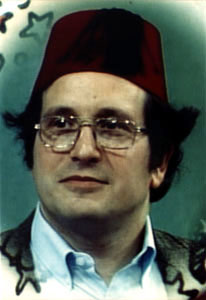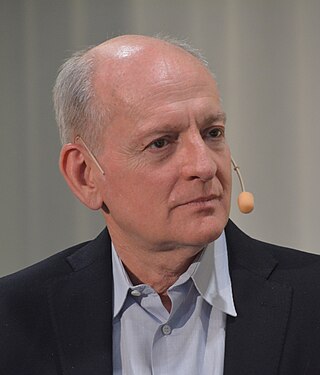Related Research Articles

Marvin Lee Minsky was an American cognitive and computer scientist concerned largely with research of artificial intelligence (AI), co-founder of the Massachusetts Institute of Technology's AI laboratory, and author of several texts concerning AI and philosophy.

Gerald Jay Sussman is the Panasonic Professor of Electrical Engineering at the Massachusetts Institute of Technology (MIT). He has been involved in artificial intelligence (AI) research at MIT since 1964. His research has centered on understanding the problem-solving strategies used by scientists and engineers, with the goals of automating parts of the process and formalizing it to provide more effective methods of science and engineering education. Sussman has also worked in computer languages, in computer architecture, and in Very Large Scale Integration (VLSI) design.

Computer Science and Artificial Intelligence Laboratory (CSAIL) is a research institute at the Massachusetts Institute of Technology (MIT) formed by the 2003 merger of the Laboratory for Computer Science (LCS) and the Artificial Intelligence Laboratory. Housed within the Ray and Maria Stata Center, CSAIL is the largest on-campus laboratory as measured by research scope and membership. It is part of the Schwarzman College of Computing but is also overseen by the MIT Vice President of Research.

Stuart Jonathan Russell is a British computer scientist known for his contributions to artificial intelligence (AI). He is a professor of computer science at the University of California, Berkeley and was from 2008 to 2011 an adjunct professor of neurological surgery at the University of California, San Francisco. He holds the Smith-Zadeh Chair in Engineering at University of California, Berkeley. He founded and leads the Center for Human-Compatible Artificial Intelligence (CHAI) at UC Berkeley. Russell is the co-author with Peter Norvig of the authoritative textbook of the field of AI: Artificial Intelligence: A Modern Approach used in more than 1,500 universities in 135 countries.

Cynthia Breazeal is an American robotics scientist and entrepreneur. She is a former chief scientist and chief experience officer of Jibo, a company she co-founded in 2012 that developed personal assistant robots. Currently, she is a professor of media arts and sciences at the Massachusetts Institute of Technology and the director of the Personal Robots group at the MIT Media Lab. Her most recent work has focused on the theme of living everyday life in the presence of AI, and gradually gaining insight into the long-term impacts of social robots.

Daphne Koller is an Israeli-American computer scientist. She was a professor in the department of computer science at Stanford University and a MacArthur Foundation fellowship recipient. She is one of the founders of Coursera, an online education platform. Her general research area is artificial intelligence and its applications in the biomedical sciences. Koller was featured in a 2004 article by MIT Technology Review titled "10 Emerging Technologies That Will Change Your World" concerning the topic of Bayesian machine learning.

Nils John Nilsson was an American computer scientist. He was one of the founding researchers in the discipline of artificial intelligence. He was the first Kumagai Professor of Engineering in computer science at Stanford University from 1991 until his retirement. He is particularly known for his contributions to search, planning, knowledge representation, and robotics.
Ekaterini Panagiotou Sycara is a Greek computer scientist. She is an Edward Fredkin Research Professor of Robotics in the Robotics Institute, School of Computer Science at Carnegie Mellon University internationally known for her research in artificial intelligence, particularly in the fields of negotiation, autonomous agents and multi-agent systems. She directs the Advanced Agent-Robotics Technology Lab at Robotics Institute, Carnegie Mellon University. She also serves as academic advisor for PhD students at both Robotics Institute and Tepper School of Business.

Richard S. Sutton is a Canadian computer scientist. He is a professor of computing science at the University of Alberta and a research scientist at Keen Technologies. Sutton is considered one of the founders of modern computational reinforcement learning, having several significant contributions to the field, including temporal difference learning and policy gradient methods.
The AAAI Conference on Artificial Intelligence (AAAI) is one of the leading international academic conference in artificial intelligence held annually. Along with ICML, NeurIPS and ICLR, it is one of the primary conferences of high impact in machine learning and artificial intelligence research. It is supported by the Association for the Advancement of Artificial Intelligence. Precise dates vary from year to year, but paper submissions are generally due at the end of August to beginning of September, and the conference is generally held during the following February. The first AAAI was held in 1980 at Stanford University, Stanford California.
Joshua Brett Tenenbaum is Professor of Computational Cognitive Science at the Massachusetts Institute of Technology. He is known for contributions to mathematical psychology and Bayesian cognitive science. According to the MacArthur Foundation, which named him a MacArthur Fellow in 2019, "Tenenbaum is one of the first to develop and apply probabilistic and statistical modeling to the study of human learning, reasoning, and perception, and to show how these models can explain a fundamental challenge of cognition: how our minds understand so much from so little, so quickly."

Eric Joel Horvitz is an American computer scientist, and Technical Fellow at Microsoft, where he serves as the company's first Chief Scientific Officer. He was previously the director of Microsoft Research Labs, including research centers in Redmond, WA, Cambridge, MA, New York, NY, Montreal, Canada, Cambridge, UK, and Bangalore, India.
David Leigh Waltz was a computer scientist who made significant contributions in several areas of artificial intelligence, including constraint satisfaction, case-based reasoning and the application of massively parallel computation to AI problems. He held positions in academia and industry and at the time of his death, was a professor of Computer Science at Columbia University where he directed the Center for Computational Learning Systems.

Yoav Shoham is a computer scientist and a Professor Emeritus at Stanford University. His research spans artificial intelligence, logic and game theory. He has also founded and sold several AI companies.

Eric Poe Xing is an American computer scientist whose research spans machine learning, computational biology, and statistical methodology. Xing is founding President of the world’s first artificial intelligence university, Mohamed bin Zayed University of Artificial Intelligence (MBZUAI).

Thomas G. Dietterich is emeritus professor of computer science at Oregon State University. He is one of the pioneers of the field of machine learning. He served as executive editor of Machine Learning (journal) (1992–98) and helped co-found the Journal of Machine Learning Research. In response to the media's attention on the dangers of artificial intelligence, Dietterich has been quoted for an academic perspective to a broad range of media outlets including National Public Radio, Business Insider, Microsoft Research, CNET, and The Wall Street Journal.
Moshe Tennenholtz is an Israeli computer scientist and professor with the faculty of Industrial Engineering and Management at the Technion – Israel Institute of Technology, where he holds the Sondheimer Technion Academic Chair.
Regina Barzilay is an Israeli-American computer scientist. She is a professor at the Massachusetts Institute of Technology and a faculty lead for artificial intelligence at the MIT Jameel Clinic. Her research interests are in natural language processing and applications of deep learning to chemistry and oncology.
Karen L. Myers is the director of SRI International's Artificial Intelligence Center, where she is also principal scientist
Michael Genesereth is an American logician and computer scientist, who is most known for his work on computational logic and applications of that work in enterprise management, computational law, and general game playing. Genesereth is professor in the Computer Science Department at Stanford University and a professor by courtesy in the Stanford Law School. His 1987 textbook on Logical Foundations of Artificial Intelligence remains one of the key references on symbolic artificial intelligence. He is the author of the influential Game Description Language (GDL) and Knowledge Interchange Format (KIF), the latter of which led to the ISO Common Logic standard.
References
- 1 2 3 4 Luttrell, Sharron Kahn (Summer 2006). "Marty Tenenbaum '64, EE '66, SM '66". MIT Alumni Association's Infinite Connection. Archived from the original on 2010-12-06. Retrieved 2017-11-07.
- ↑ "Jay Tenenbaum". The Mathematics Genealogy Project.
- ↑ Goodin, Dan (February 21, 2001). "How some make a million working at a non-profit". CNN. Retrieved 7 November 2017.
- ↑ Tenenbaum, Jay M. (2006). "AI Meets Web 2.0: Building the Web of Tomorrow, Today" (PDF). AI Magazine. American Association for Artificial Intelligence. 27 (4). doi:10.1609/aimag.v27i4.1909. S2CID 877559. Archived from the original (PDF) on 2017-11-08.
- ↑ "Jay Marty Tenenbaum Ph.D.: Executive Profile & Biography". Bloomberg. Retrieved 7 November 2017.
- ↑ "Our Story". Cancer Commons. Retrieved 2021-04-26.
- ↑ "Elected AAAI Fellows". www.aaai.org.
- ↑ Swartz, Aimee (19 July 2015). "The 'LinkedIn' for Cancer". Newsweek.